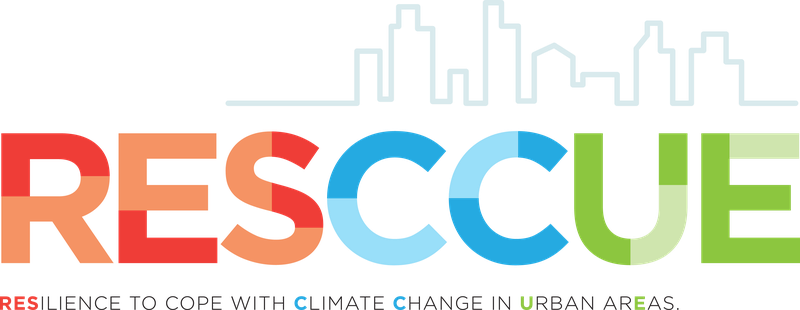All official European Union website addresses are in the europa.eu domain.
See all EU institutions and bodies
- BG български
- ES Español
- CS Čeština
- DA Dansk
- DE Deutsch
- ET Eesti keel
- EL Ελληνικά
- EN English
- FR Français
- GA Gaeilge
- HR Hrvatski
- IT Italiano
- LV Latviešu
- LT Lietuvių
- HU Magyar
- MT Malti
- NL Nederlands
- PL Polski
- PT Português
- RO Română
- SK Slovenčina
- SL Slovenščina
- FI Suomi
- SV Svenska Non-EU Languages
- IS Íslenska
- NN Nynorsk
- TR Türkçe
RESCCUE

RESilience to cope with Climate Change in Urban arEas – a multisectorial approach focusing on water
Today, 54% of the world’s population lives in cities, a proportion that is expected to increase to 66% by 2050 (UN, 2014). These cities are constantly facing different impacts of climate change that not only cause significant economic losses but also pose challenges to urban living: 8 of the 10 most populous cities are vulnerable to earthquakes, and 6 of the 10 are at risk from floods, storm surges and tsunamis.
In this context, Europe’s first large-scale innovation and urban resilience project, RESCCUE was born to improve urban resilience: the capability of cities to anticipate, prepare for, respond to, and recover from significant multi-hazard threats with minimum damage.
The RESCCUE project aims to help urban areas around the world to become more resilient to climate change.
More precisely, RESCCUE will bring this objective to practice by providing innovative models and tools to improve the ability of cities to withstand and recover quickly from multiple shocks and stresses and maintain continuity of services.
An end-users – city managers and urban service operators – oriented toolkit will have the capability to be deployed to different types of cities, with different climate change pressures.
The specific objectives of RESCCUE are:
- To deliver a framework enabling city resilience assessment, planning and management.
- To develop an adaptation strategies portfolio, including nature-based solutions, and test it in the 3 research sites: Barcelona, Lisbon and Bristol.
- Elaborate a Resilience Action Plan (RAP) for each of the research sites, considering the inputs of all local partners and stakeholders and using all the outputs of RESCCUE.
Cities, being complexes of interdependent systems, cannot be understood by sectorial and disciplinary approaches alone. In this sense, RESCCUE goes beyond conventional urban resilience approaches delivering a forward looking, multi-scale, multisectorial and multi-hazard methodology. In order to interconnect the several sectorial models, the project will take advantage of the existent HAZUR® tool. The HAZUR® approach is based on a method and software (as a service) to help city decision makers and urban resilience professionals make fully informed and structured choices to make their cities more resilient analyzing the interdependencies between different city services, monitoring the city and simulating cascade effects in case of impacts that may affect the city.
Based on this holistic approach, RESCCUE will analyze an interconnectedness of different urban systems, taking as starting point the water sector. This sector has been highlighted due to the importance of water- related risks in the correct functioning of a city: droughts or heavy rains can produce critical impacts on strategic urban services such as water supply, solid waste, telecommunication, energy supply, transport, etc.
Watch a video on the RESCCUE project here.
Most of world's population will end up living in cities, therefore it is critical and highly urgent to have tools available to assess, plan and monitor urban resilience in an integral way. This is where RESCCUE will contribute with a set of innovative tools for urban resilience assessment, planning and management. These tools will help cities with their climate change adaptation strategy and will also improve their current capacity to cope with emergencies.
The RESCCUE Toolkit allows the users to navigate through the different guidelines and find all of the project results, including a best practice e-book manual, databases, tools, methodologies and templates. Additionally, from the RESCCUE Toolkit the user can access the RESCCUE maps on the CLARITY portal and interact with them. Finally, general information on the three case studies can be found as well as extra materials, such as scientific publications, maps and deliverables of the RESCCUE project.
Aquatec, Proyectos para el sector del Agua, SA | ES |
|---|---|
Cetaqua, Centro Tecnologico Del Agua, Fundacion Privada | ES |
| Fundacion Para La Investigacion Del Clima | ES |
| Opticits Ingenieria Urbana SL | ES |
| University of Exeter | UK |
| Laboratorio Nacional de Engenharia Civil (LNEC) | PT |
| Ajuntament de Barcelona | ES |
| Fundacio Institut De Recerca De L'energia De Catalunya | ES |
| United Nations Human Settlements Programme | Kenya |
| Endesa Distribucion Electrica S.L. | ES |
| Camara Municipal de Lisboa | PT |
| Edp Distribuicao Energia S.A. | PT |
| Hidra - Hidraulica E Ambiente, Lda | PT |
| Bristol City Council | UK |
| Wessex Water, SL | UK |
| Urban DNA Solutions LLP | UK |
| Aguas do Tejo Atlantico SA | PT |
| Ecole des Ingenieurs de la ville de Paris | FR |
Language preference detected
Do you want to see the page translated into ?
